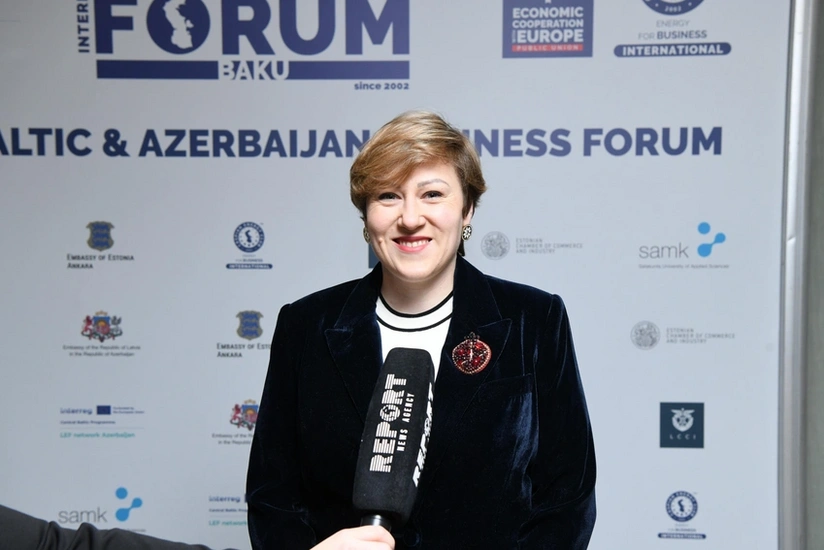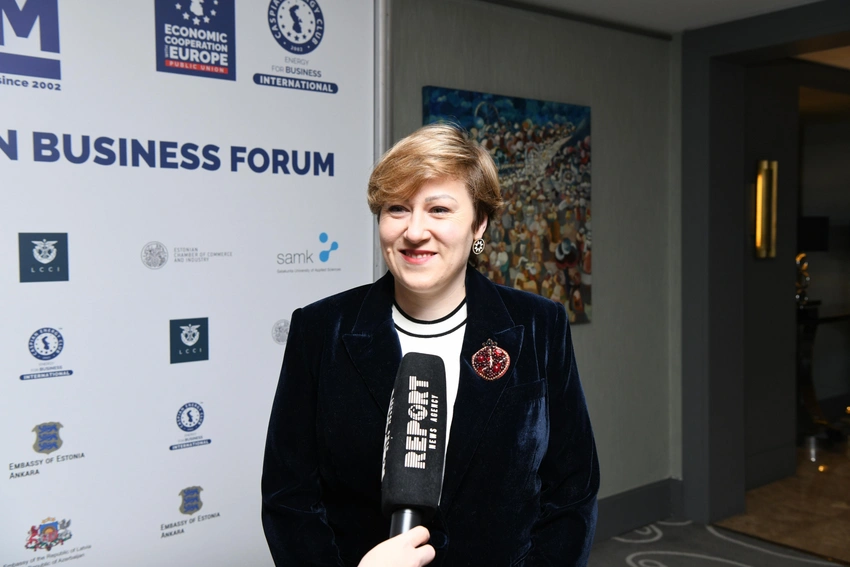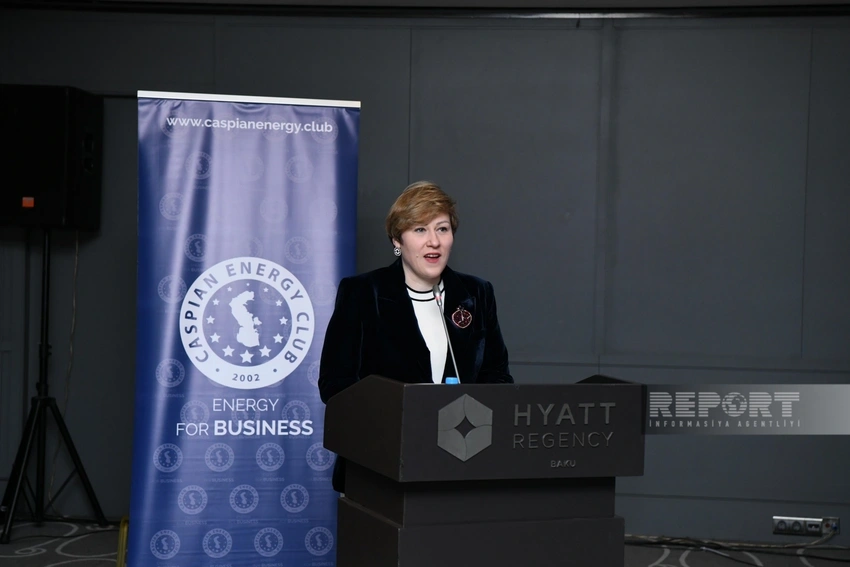Liga Siceva: Azerbaijan becoming gateway for Baltic businesses to South Caucasus
- 27 November, 2025
- 16:11

The Baltic and South Caucasus regions are strengthening economic ties, emerging as new hubs of trans-Eurasian cooperation. Against the backdrop of a restructuring of global supply chains, growing interest in the Middle Corridor, and the green transformation of the economy, the Latvian Chamber of Commerce and Industry (LCCI) is actively building new partnerships in Azerbaijan and the South Caucasus countries.
In an interview with Report, Liga Siceva, director of the EU Projects Department of the LCCI and Director of LEF network Azerbaijan, discussed Latvia's priorities for 2025-2026, the potential for Azerbaijani-Baltic cooperation, the role of the Middle Corridor, and why trust and openness are the foundation of sustainable business projects.
Report presents the interview:
- What areas of cooperation with international partners does the LCCI consider strategic for 2025-2026?
- The years 2025-2026 are strategically important for the LCCI as we continue to expand our international network by attracting new representatives who can serve as official international delegates of the Latvian Chamber of Commerce and Industry.
Today, I was pleasantly surprised to see that the ASK [National Confederation of Entrepreneurs (Employers) Organisations of the Republic of Azerbaijan] is also using a similar model by appointing representatives in various countries. The LCCI has been developing the same concept and aims to strengthen this network over the years. And then we have also set a strategy to have a great list of cooperating organisations at the international level.
We are open to signing memorandums of understanding with potential international business support organisations that could become our partners. During the forum in Baku [Central Baltic - Azerbaijan Business Forum], we signed three memorandums - with the Caspian Energy Club, with ASK, and with the Nordic Business Community Azerbaijan. All of the organisations are important counterparts for future cooperation. Especially the Caspian Energy Club, which has a great network of acting and the most important companies of Azerbaijan. During the project, we did more than was planned by organising an additional two missions (the first in 2023 to Latvia and sthe econd to Baku, Azerbaijan in 2024), both with the aim to strengthen business cooperation between Latvia and Azerbaijan. Important roles include strong cooperation with the Embassy of Latvia. Also, in the framework of the project, Finland and Estonia. Generally, I"m proud of Latvia, that we were able not only to promote Azerbaijan as a potential business partner to Latvian companies, but also to strongly increase awareness in Finland and Estonia. Some of the companies, in case of great results, are considering an event to invest in Azerbaijan. MoU organisations [Caspian Energy Club, ASK, Nordic Business Community Azerbaijan] are important stakeholders in the project, not to finalise, but to bring results in the next cooperation level. Also, important to mention local service providers, for example, AzeTurizm, which is an important counterpart in the project.
We are also strengthening our international impact by participating in organisations such as Eurochambers, where our president serves as Vice President, and the International Chamber of Commerce, where he has been elected as one of the members of the WCF General Council.
- How have the priorities of Latvian businesses in the field of international partnerships changed after the geo-economic shifts of recent years?
- Let"s be honest - geography is geography. We are located next to Russia, and naturally, many companies are doing business with that country. However, as the global situation has evolved, businesses have been switching to new markets, and have been doing so quite intensively.
Companies are also seeking new logistics routes, as transportation through Russia has become risky. And therefore, we are looking for the Middle Corridor here for going for Central Asia. We are looking for cost-efficient routes because the geopolitical shifts have significantly increased logistics expenses - a serious challenge, especially for sectors like food production that deal with time-sensitive goods with some kind of deadlines for using and these kinds of things.
- Are there any new projects or initiatives within EU programs that could involve the participation of South Caucasus countries, particularly Azerbaijan?
- Actually, we have a dream - to launch a project that would foster international trade between South Caucasus countries, with Azerbaijan as the main entry point. However, when applying for international project funding from the European Union, we must align with the Multiannual Financial Framework and the overall EU strategy.
At the moment, the framework is being updated, so some funds are temporarily paused or reallocated. So, they are rewriting all the documents, evaluating what and when they are going to give some supporting funds for these kinds of projects. Once the new strategy is approved, we expect to be able to submit a project proposal focused on the South Caucasus, with Azerbaijan as a key market entry hub.
We are also considering Uzbekistan and Kazakhstan as part of this vision. I would start with Azerbaijan and expand both eastward and westward - but let me keep some of our plans a secret for now.
- The LEF Network Azerbaijan project became an example of successful cooperation between the businesses of both countries. What key results have been achieved? Are there plans to expand the format to Georgia, Kazakhstan, or Uzbekistan?
- The achievements are significant. Pragmatically speaking, we have facilitated more than 10 companies from the Central Baltic region that have signed more than 15 cooperation agreements between our countries. And we are very proud of that. These include partnerships in education, medicine, technology, green water management, logistics, railway industries and so on.
But beyond the numbers, one of our greatest achievements is that during all those turbulent times that we have faced during those three years, we have maintained excellent relationships with our Azerbaijani partners, strengthened cooperation, and built genuine friendships that lay the foundation for future collaboration.
As for expansion - yes, we see potential to extend this format to Georgia, Kazakhstan, and Uzbekistan. However, adding new countries increases complexity - each brings its own culture, language, and economic environment. Managing four countries already requires thoughtful coordination. And if we are adding more cultures, this means more countries with also religious, political structure, economic differences, market requests and interest needs and everything, it might be very interesting.
Still, I believe trade missions remain one of the most effective tools for cooperation. And, of course, having strong and reliable local partners is the key to success.

- In our last interview, you noted a growing interest in green technologies. Which Latvian solutions, companies, or startups might be of interest to Azerbaijani partners?
- So generally, let's look at the structure of the startups we have. We have fintech and AI, and deep tech startups.
But their innovations to develop sometimes take time. Because if we are speaking of fintech startups or about IT, whatever startups, they simply make things, and it happens quickly. But if we are speaking about green technologies, then it's a different story. In Latvia, of course, generally, startups are generally looking for investors because they are coming up with ideas. And of course, from an Azerbaijani perspective, we have already discussed it, that they would be interested also to cooperate with Azerbaijani investors.
So, it means that it could be an option for Azerbaijan to get innovative technologies from startups and actually develop those innovations based on Azerbaijani needs. We are also welcome to cooperate with the startup ecosystem in Azerbaijan as well.
Innovations, IT solutions, waste management, circular economy and green technologies are strong sectors in Latvia. Also, one shouldn"t forget about the classical sectors – like food production, wooden production, metal working, etc. Important to note that Latvia also has smaller, but unique niche product producers in different sectors, which could be interesting for Azerbaijan. The best would be to develop a business cooperation network, and then all requests and offers would be evaluated on a case-by-case basis.
- How does Latvia promote the development and export of technologies in the fields of renewable energy, waste recycling, and energy efficiency?
- Generally, Latvia is good with that, we have renewable energy, and we mainly use this energy for our personal country needs. But if we are speaking about exports, I think we are in a common network of the European Union, and there are also those energy sales. In Latvia, at the moment, we have great investments in solar panels.
We are opening solar panel parks and intensively working on wind parks as well. We try to always find the best solutions that renewable energy is also open to people, and people can be happy that there are also these kinds of parks, and feel comfortable with that.
- In your opinion, how could the Baltic countries and Azerbaijan develop joint projects in green energy or in implementing energy-efficient solutions in industry and logistics?
- Every sector deserves exploration, but much depends on concrete needs and requests. We are open to cooperation, yet it is most effective when we clearly understand Azerbaijan"s priorities and interests.
Because otherwise, I'm always making an example that sometimes we are going to the bread shop and are willing to buy a bread, but actually this is a fish shop, you know. So, if somebody is offering a fish, but somebody is willing to buy bread, there won't be a deal. And this is the case, but I'm also saying that we would like to know a clear strategy and vision and needs from your side. And then we can try to provide our best solutions and know-how.
Generally, I think the main pillars are the education field, because universities are preparing study programs and students and know-how for companies and also for the ecosystem. I think it's one step. The second step is that business support organisations should cooperate. I think all countries should think about how to make them stronger for international cooperation.
But when you are cooperating with business support organisations, you already have a database and platform for businesses. And then it's just simple trade missions. Trade missions are the best way how we can develop this cooperation by putting people together and putting businesses together to achieve these results.
- Is there a possibility for Latvian companies to participate in decarbonization projects for transport or railway infrastructure along the Middle Corridor?
- I think yes, but in all these huge logistic projects, strategic projects, the content of the projects is very diverse. So, it depends, again, on the needs. Because, of course, we don't have a huge railway factory, but definitely we have a technology that could be very highly necessary for logistic routes for the Middle Corridor. So definitely, I think yes.
- Are there specific examples of Latvian companies already using this route for trade with the South Caucasus or Central Asian countries?
- Yes, some companies are already doing so. But at the moment, this is a question of prices. Because if you look at where Latvia and Azerbaijan are, people are very willing to use the Middle Corridor. Actually, companies are willing to use the Middle Corridor, but it's a question of cost. If you are looking from Latvia to Azerbaijan, then they should be thinking about cost efficiency for using this route.
The Middle Corridor has great potential - geographically, it provides an excellent link from Finland all the way to Central Asia through Azerbaijan.
- What are the prospects, in your view, for integrating Baltic region ports with the transport infrastructure of the Middle Corridor?
- That depends on national strategies, but Latvian ports already have well-developed infrastructure. I think in all kinds of ways, it could be interesting to cooperate with Azerbaijan ports and to be connected, because it's vital logistics. If connected, we can be competitive in international trade.

- How is the potential impact of the Zangazur Corridor (TRIPP on Eurasian logistics and the European Union"s transport connectivity policy assessed in Latvia?
- Definitely positive. We see this route as an opportunity to strengthen Latvia"s connection with Azerbaijan and improve overall connectivity.
- Can we expect new export and investment support tools to appear in the South Caucasus region under EU programs or LCCI initiatives?
- Unfortunately, this depends on the EU"s broader political and financial decisions. We can propose ideas and cooperation models, but inclusion in EU programs is beyond our direct control.
Nevertheless, we remain optimistic. If global politics take a positive turn and funding becomes available again, we will be ready to act immediately.
- What role do chambers of commerce and industry play in promoting direct business contacts between Latvia and Azerbaijan?
- Right now, they play a crucial role. When we first launched our project, business interest was quite low. It was difficult to find even five Latvian companies willing to explore the Azerbaijani market.
I think very strongly at this moment, because I already mentioned yesterday in the forum [Central Baltic-Azerbaijan Business Forum hosted in Baku] as well, that, really, in the early steps when we started the project, interest was quite low between the companies in all three countries.
There were stereotypes and a lack of awareness, so I personally reached out to companies, shared stories, photos, and experiences, explaining that Azerbaijan has great potential, a strong economy, and wonderful people.
Today, we have more than 40 companies and a huge group from three countries. It worked very well. But, of course, we are ready to continue to promote Azerbaijan. Through the platform www.export-cluster.eu, in collaboration with AZPROMO [Export and Investment Promotion Agency of the Republic of Azerbaijan], we share information about Azerbaijan"s economy and investment opportunities. Together with the Embassy of Azerbaijan in Latvia, we are also planning promotional events.
So, we really hope that this cooperation will be successful, and the interest might be there as well from the Latvian side. So, we are doing our best. We are really doing our best to tell and spread a good word about Azerbaijan in Latvia. I will say honestly, not only in Latvia, Estonia and Finland as well.
- What advice would you give to companies that want to enter the Azerbaijani market for the first time?
- First of all, leave stereotypes behind and be ready for a long game. Second, be prepared for a long-term commitment - business in Azerbaijan, as in any international context, is built on relationships and trust. If you have relationships, you can move forward with business.
And the third, to come more often to Azerbaijan, to be here and to meet people and make contacts and spread great word about Azerbaijan, not only in our country, but generally. I have faced a situation when, for example, I'm also sometimes working in Brussels, and I'm going to Brussels, and I'm telling everybody about Azerbaijan, that it's a great country, and people get more interested.
